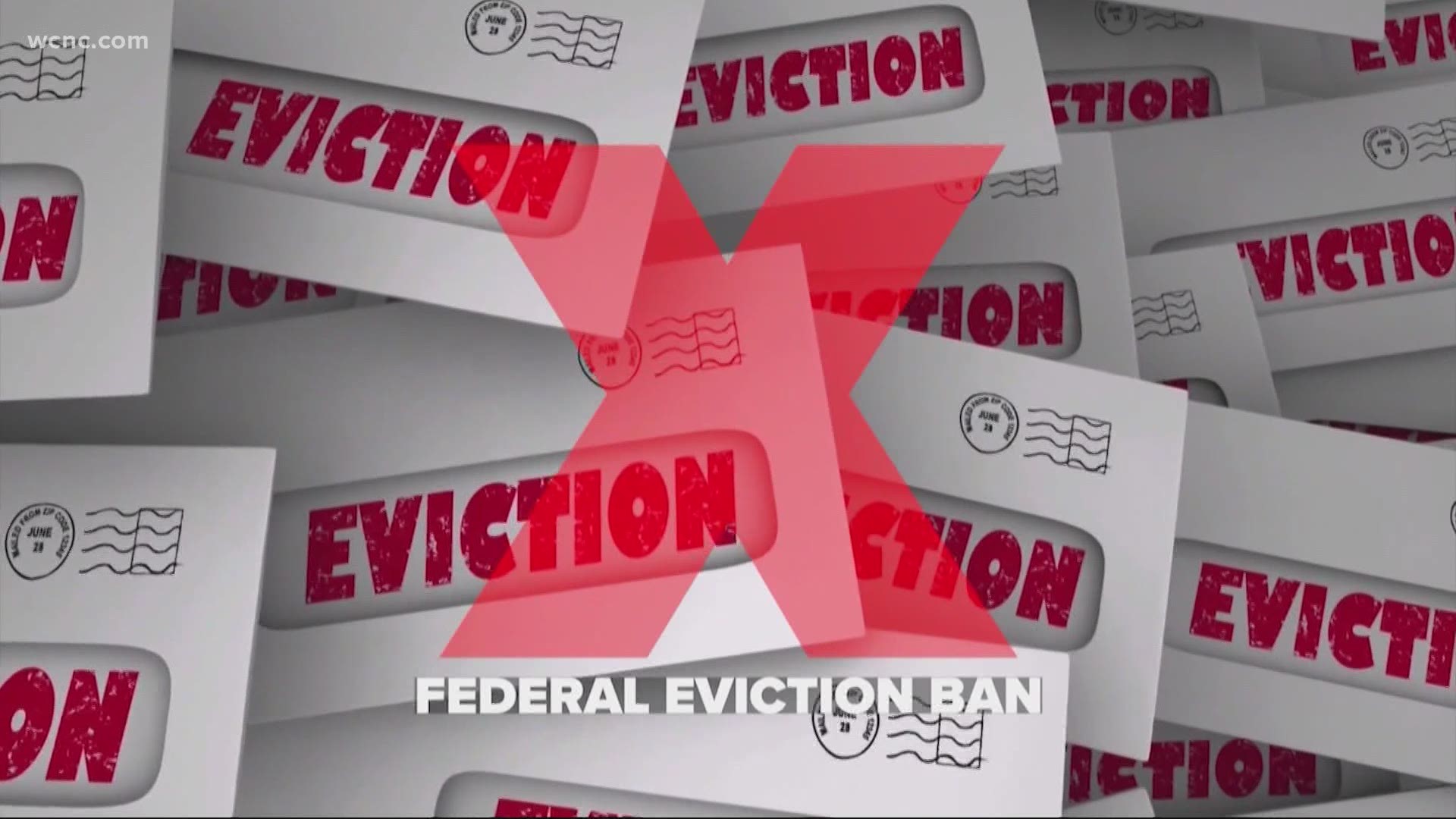CHARLOTTE, N.C. — Just two days before it was set to expire, the Centers for Disease Control and Prevention (CDC) extended the national ban on evictions through June, citing COVID-19. The CDC says it is safer to keep people in their homes, rather than in shelters or crowding in with family.
To be eligible for protection, renters must earn less than $99,000, or less than $198,000 for couples filing jointly. You must also fill out and submit a form found on the CDC’s website, or in-person at your local library.
“The problem is that while it’s a good move from a public health standpoint, renters are falling further and further behind on their rent, this means that landlords aren’t receiving their rent, which means in many cases they can’t pay their mortgage, or pay local property taxes, which support public services, which we all benefit from,” Lee Reiners, Executive Director of the Global Financial Market Center at the Duke University School of Law, said.
Reiners is also one of several stakeholders who make up the Duke Eviction Prevention Working Group, which he described as, “a broad coalition of stakeholders, representing both landlord interests as well as tenant interests.”
In February, the Working Group sent a letter to state leaders, including Governor Roy Cooper, calling for urgency in distributing federal and state rent support.
“It’s important to get this money out the door as quickly as possible and we hope our letter can be a guide to policymakers as to how to do that,” Reiners said, adding it should include support not only for renters but landlords too.
“30- to 40% of landlords in North Carolina are what we call ‘mom and pop’ landlords, you know folks that maybe own one or two rental properties to sort of supplement their income, and if they’re not receiving rent, these folks are really hurting,” he says.
Landlords like Chrystal Jeeter are feeling the impact. Jeeter said when the pandemic first hit, she had roughly five tenants lose their jobs.
Jeeter said she was understanding and flexible, but says one particular tenant went six months without paying rent.
“I mean you’re looking at anywhere from $4,000 to $10,000 that you could be at a loss at any given time,” Jeeter said.
Jeeter said during a brief window in July, she filed paperwork with the county to have that tenant evicted, a process she said took 90 days.
“When you have a true person who’s trying to pay and pay what they can when they can, that’s a different scenario than when you have people who rely on the system and the fact that they know that the eviction has been pushed out and that they can’t be put out for not paying,” Jeeter said.
With the eviction ban in place, Jeeter said it’s now left her without options, saying it’s crushing to see some tenants seemingly taking advantage of the situation.
Reiners said when the eviction ban does get lifted, he predicts a tsunami of evictions, saying even though many have now returned to work and can afford rent monthly, he believes the overdue bills will be too much for some.
“When the eviction moratorium expires, that bill is going to come due,” he said.
Also, responding to news that the eviction ban was extended Monday, was the Greater Charlotte Apartment Association. Member Jennings Snider also sits on the Duke Eviction Prevention Working Group.
“Stopgap policies like eviction moratoria jeopardize the ability of housing providers to pay their debt service and sustain rental housing portfolios," Deidre Wilson, Greater Charlotte Apartment Association Board President said.
“Landlords have been carrying the burden for almost an entire year and the time is drawing near when they will no longer be able to do so," she said.
In a statement sent to WCNC Charlotte, the organization said:
"Cancelling rent is no more an option than asking the grocery stores to not expect payment for a basic necessity like food. Ultimately, our Association’s perspective is that you cannot have eviction moratoria without having rental assistance that is as expedient in its positive benefit to rental housing providers as the moratorium is to renters."
The organization says as of Dec. 21, 2020, 18.9% of North Carolina’s renter households were behind on their rent payments.
They say for every 1% of renters not paying rent during a 6-month eviction moratorium, it leads to $21.9 million in decreased apartment rental income, which in turn leads to a $4 million decrease in property tax revenue.
“For the last year, local governments and landlords have worked together to ensure that eligible renters received assistance and were able to stay in their homes," the organization said. "It is unfortunate that policymakers continue to rely on eviction moratoria and inadequate emergency rent/utility funding to solve the crisis despite the fact that struggling renters continue to accrue insurmountable debt that will eventually become due."

